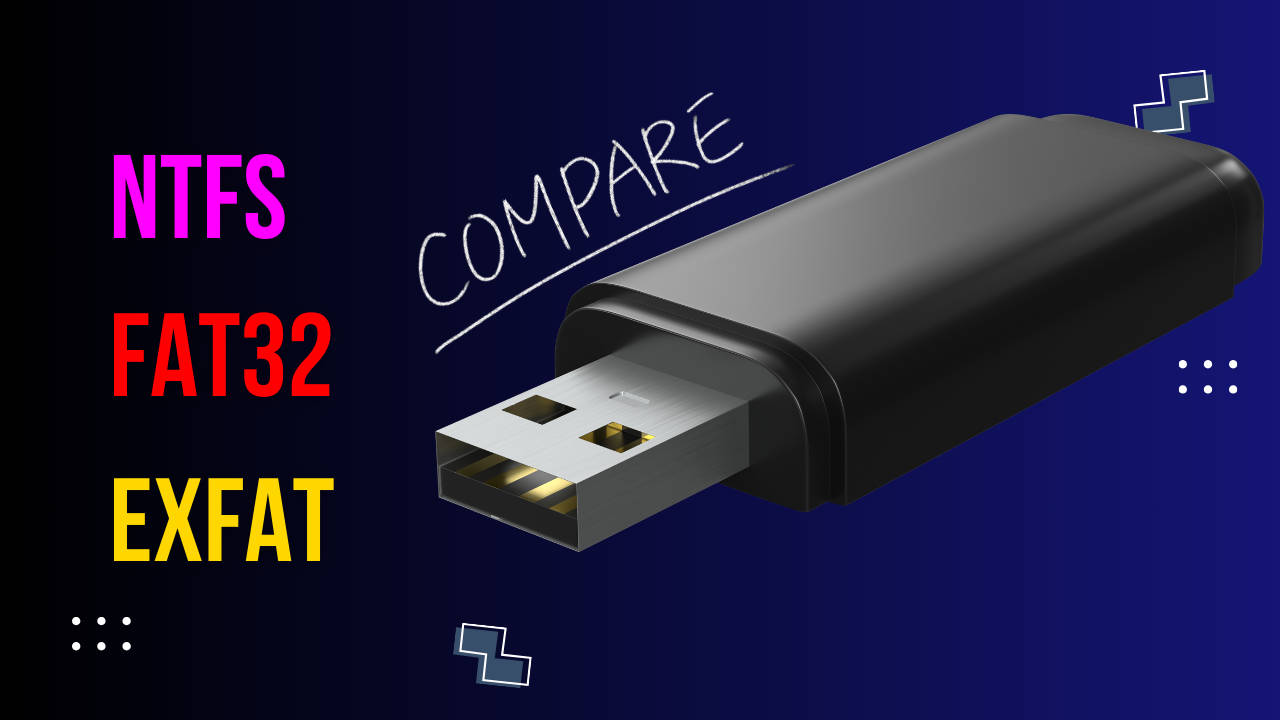Table of Contents
Intro

“NTFS vs FAT32 vs exFAT: Understanding the Differences to Make an Informed Choice”
You might not know this, but file systems are the unsung stars of our digital lives. They decide how to store, organize, and handle data on hard drives (HDDs), solid-state drives (SSDs), and USB flash drives. Knowing the differences between NTFS, FAT32, and exFAT is important whether you’re setting up a new drive or trying to figure out which system is best for a certain job. Let’s get into the specifics of these methods so that you can make an intelligent choice.
NTFS (New Technology File System)
Advantages
- High Stability and Security: NTFS is renowned for its robustness and security features, offering file encryption, permission settings, and a data recovery function to safeguard against disk failure.
- Large File Support: It can store files as large as 16TB, making it ideal for handling extensive data.
- Advanced Features: Supports file compression and encryption, enhancing functionality and protection.
Disadvantages
- Performance: While incredibly feature-rich, NTFS may exhibit slightly lower performance compared to FAT32, especially on older devices.
- Compatibility: Some older operating systems and devices may struggle with NTFS, limiting its universality.
FAT32 (File Allocation Table 32)
Advantages
- High compatibility: With support from almost all operating systems and devices, FAT32 excels in compatibility.
- Simplicity and Performance: It offers a straightforward structure and fast performance, making it efficient for basic storage needs.
Disadvantages
- File Size Limit: FAT32 cannot store files larger than 4GB, posing a significant limitation for high-resolution media or large datasets.
- Efficiency: It is less stable and secure than NTFS and becomes inefficient for drives larger than 2TB.
exFAT (Extended File Allocation Table)
Advantages
- Versatility: exFAT combines the benefits of NTFS and FAT32, supporting large files up to 16TB and ensuring high compatibility with modern devices.
- Performance: It offers faster performance than NTFS, making it suitable for both large files and quick data transfers.
Disadvantages
- Security: While more reliable than FAT32, exFAT does not offer the same level of security and advanced features as NTFS.
- Older System Compatibility: Some older systems may not support exFAT without additional software.
Comparison Table of NTFS vs FAT32 vs exFAT Compared
Below is a table that highlights the major pros and cons of NTFS, FAT32, and exFAT, helping you to quickly grasp the essential differences and decide which file system suits your requirements best.
| Feature | NTFS | FAT32 | exFAT |
|---|---|---|---|
| Compatibility | Lower with older systems and devices | High across most devices and systems | High with modern systems, lower with older systems |
| File Size Limit | Up to 16TB | Up to 4GB per file | Up to 16TB per file |
| Performance | Good, slightly lower than FAT32 in some cases | Fast, especially on older devices | Faster than NTFS, comparable to FAT32 |
| Security and Stability | High, with advanced features like encryption | Lower, lacks advanced security features | Moderate, less than NTFS |
| Use Case | Ideal for Windows PCs, requiring high security and handling large files | Best for universal compatibility and older devices | Suitable for large files and both Windows and Mac compatibility, without the need for NTFS’ advanced security features |
Choosing the Right File System
In conclusion, selecting the right file system is a critical decision that depends on a variety of factors, including the devices you use, the size of the files you need to store, and the level of security you require. This table should serve as a guide to help you understand the strengths and limitations of each file system, enabling you to make the best choice for your specific needs. Whether you prioritize compatibility, file size, performance, or security, there’s a file system tailored to your requirements.
Discover More
If this article made you happy and taught you something, I’m sure our next article will do the same for you. Each piece is carefully written to help you understand things better and enjoy reading more. So, to keep exploring and having fun, just click on this link to go to our next story.



